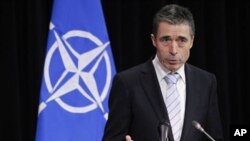NATO's secretary-general says foreign forces in Afghanistan will remain on combat duty during the scheduled transition to Afghan security control in 2014.
That statement by Anders Fogh Rasmussen came after U.S. Defense Secretary Leon Panetta said American forces' combat role will end next year, more than a year before the transition is supposed to be complete.
Panetta's statement surprised many observers.
He said he hopes U.S. troops in Afghanistan, by far the largest and strongest component of the NATO-led force, will be able to move into a training and support role during the second half of next year. NATO's plan is to hand full security responsibility to the Afghans at the end of 2014, and while some changes had been expected during a gradual transition, many were surprised at the U.S. defense secretary's remarks.
Since Panetta spoke on Wednesday, American and NATO officials have been trying to explain the new prominence of 2013, at least in U.S. plans. At the conclusion of the defense ministers' meeting, Secretary-General Rasmussen was clear that coalition troops will be involved in at least some combat during the transition period.
“Even after transition has begun across the whole of the country, we will continue to support Afghans to make it happen," he said. "That means training. It means assistance. And, where necessary, it also means fighting alongside our Afghan partners."
The NATO chief said the U.S. desire to complete its transition from combat to training and support next year does not amount to disengagement from combat.
“Let me stress that I have not heard of any American plan to disengage from combat. You will of course see a gradual change of the role of our forces from combat to support. You might say that the focus will shift from combat to support. But combat operations will still be needed during that period of transition,” said Rasmussen.
NATO is also grappling with France's decision to withdraw its combat troops next year. With no French combat forces and the United States' desire to accelerate its transition to a support role, Afghanistan's fledgling military and police forces will likely have to take on more responsibility more quickly than had been expected.
But despite the French and American announcements, Secretary-General Rasmussen says the scope and pace of the transition will still depend on actual security conditions in Afghanistan as the months go by.
NATO's top leaders are expected to have more to say about the Afghanistan transition plan at their summit in Chicago in May.















